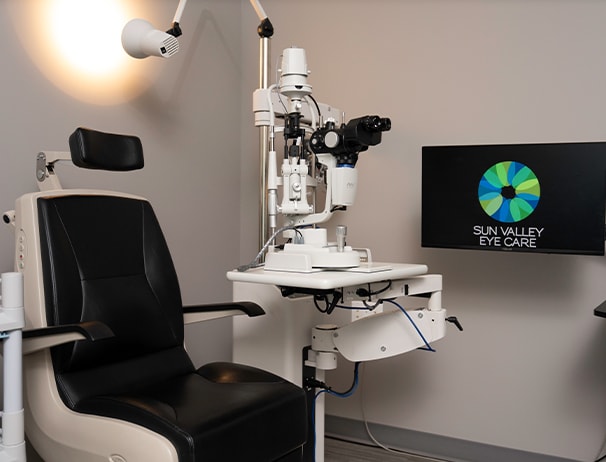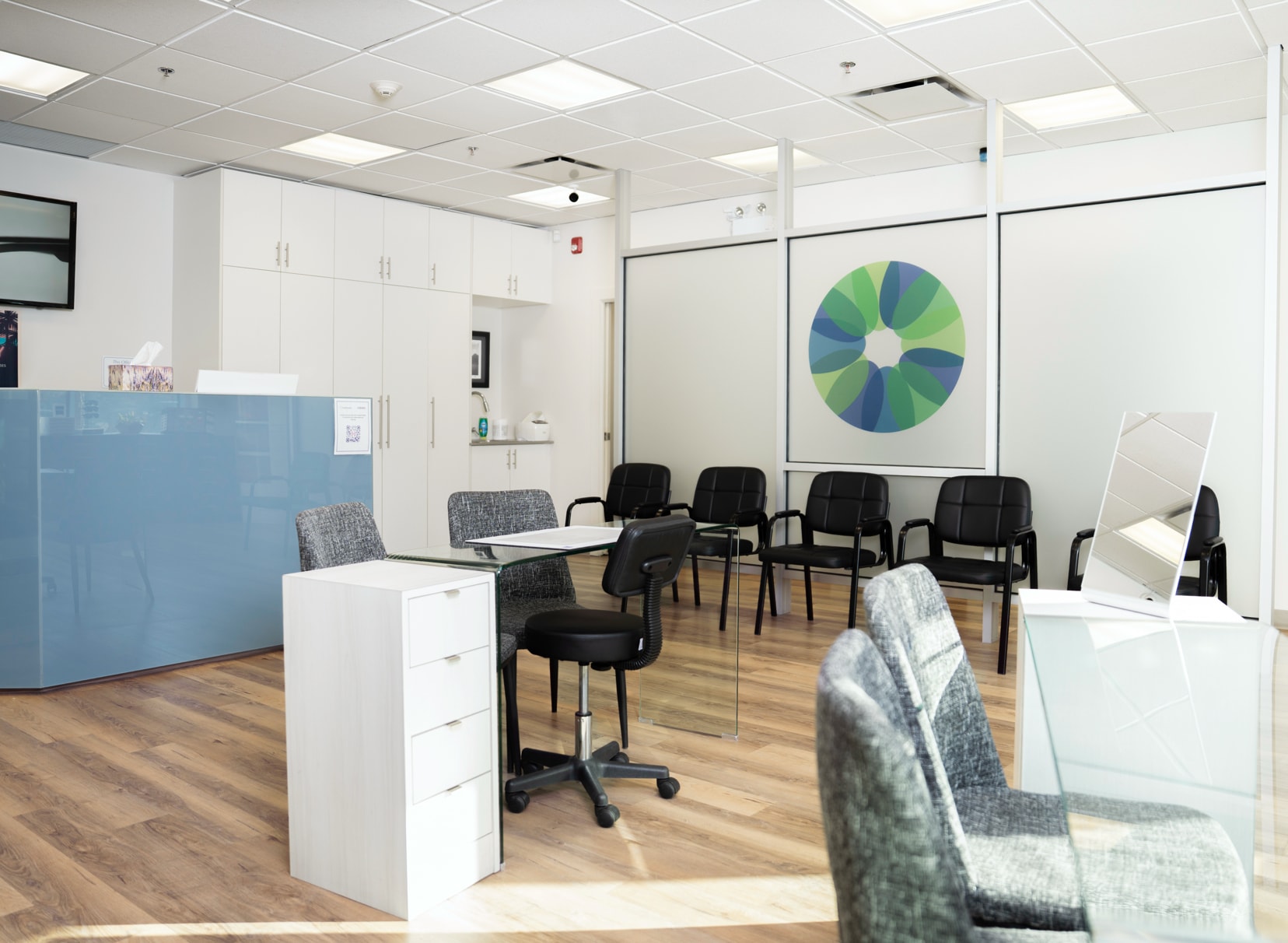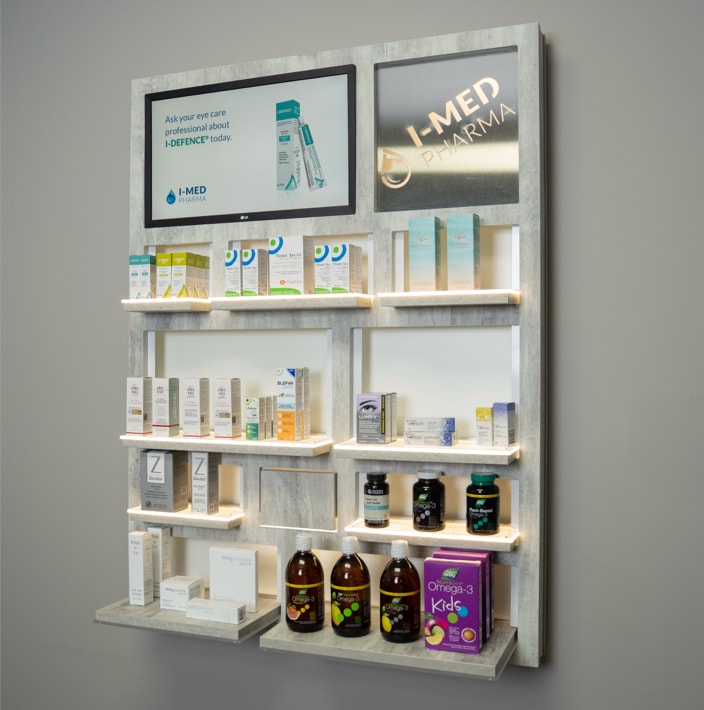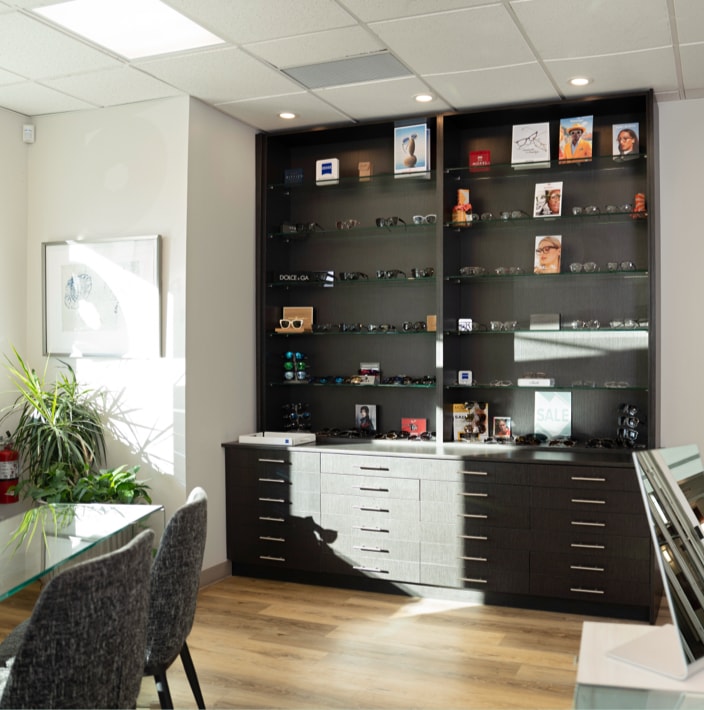Monitoring Your Eye Health with Diabetes
All types of diabetes impact your overall health, including your eyes. Living with diabetes increases your risk of several vision complications, including diabetic retinopathy, cataracts, and glaucoma.
At Sun Valley Eye Care, we perform thorough diagnostic tests and assessments during your eye exam to monitor your eyes for any signs of complications. We use eye care technology to enhance our skills and detect conditions early.
By monitoring your eye health through regular eye exams, your optometrist can help you reduce your risk of serious complications that could lead to vision loss. Protect your eyesight for the future and book your diabetic eye exam today.
Book Appointment
How Diabetes Affects Eyes
High blood sugar levels caused by diabetes can damage your blood vessels, especially the small, delicate ones in your eyes.
Unregulated blood sugar levels can cause bleeding, swelling, and abnormal blood vessel growth in the eyes, which can lead to vision loss if left untreated. Frequent eye exams can help monitor your eyes to detect these complications early.

What Is Diabetic Eye Disease?
Diabetic eye disease is a group of conditions that affect the eyes as complications of diabetes. Consistently elevated blood glucose can damage your blood vessels. If the blood vessels in your eyes weaken and leak fluid or begin to grow abnormally, they can cause vision problems.
Regular eye exams help us detect signs of diabetic eye disease before it causes vision loss. While we strive to catch diabetic eye disease before you notice changes to your vision, some symptoms of diabetic eye diseases include:
- Blurry vision
- Black spots or holes in vision
- Flashes of light
- Floaters in vision
- Loss of vision
Diabetic retinopathy is caused by sustained high blood sugar. Diabetic retinopathy leads to swollen blood vessels that can blur vision. Untreated, these swollen blood vessels can break and leak into the retina, often causing permanent vision loss.
Diabetic macular edema is a severe complication of diabetic retinopathy. It occurs when the swelling affects the macula, which is the part of the retina responsible for central and colour vision. When diabetic retinopathy progresses and damages the macula, your central vision will be damaged. This can impair your ability to read, write, drive, and even recognize faces.
Our Approach to Diabetic Eye Care
Our approach to diabetic eye care does not differ greatly from our typical eye exam process. Because we are already monitoring your eye health regularly, being diagnosed with diabetes won’t greatly impact your eye care regimen.
We may recommend more frequent eye exams to monitor your eyes more closely. Having diabetes increases your risk of eye disease, but with proper management and monitoring, we can help reduce your risk and catch signs faster. The earlier we can detect and manage diabetic eye disease, the more effective the treatments can be.
During your diabetic eye exam, we will complete more extensive testing to monitor your eye health. This may include using technology such as optos retinal imaging and OCT scans to get a clear, in-depth picture of your eyes and retinas. It will also include iCare tonometry to measure your eye pressure and optos autofluorescence testing.
Retinal imaging refers to taking a photograph of your retina, the light-sensitive tissue that lines the inside of your eye. On a retinal image, your optometrist can see your retina, blood vessels, optic nerve, and macula (the central part of your retina responsible for central and colour vision).
For diabetic eye exams, retinal images allow us to monitor the health of your blood vessels, retina, and macula, and detect any changes to these structures from previous scans.
Fundus autofluorescence (FAF) uses the naturally occurring fluorescent properties of lipofuscin (a yellow-brown pigment made of lipids and proteins) found in the retina.
In people with diabetic retinopathy, FAF can show significant alterations that don’t appear on colour imaging. This allows us to detect early changes caused by the progression of retinopathy more clearly than through standard retinal imaging.
OCT scans take scans of your eyes using light energy to create cross-sectional images. OCT maps the layers of your retina. Using these scans, we’re able to measure your retinal thickness and your intraocular pressure (eye pressure).
Through OCT, we can monitor microscopic changes to your retina and detect signs of disease or damage to eye tissues. It is a powerful diagnostic tool for diabetic eye disease.
Tonometry measures the pressure inside your eye. The iCare tonometer gently taps the eye to measure the intraocular pressure. This test is important, as increased eye pressure may indicate that fluid is leaking into the eyes due to diabetic retinopathy.
Stay Ahead of Diabetic Eye Disease
Together with your primary care practitioner, your optometrist can help you monitor your diabetes and prevent complications affecting your vision. We’re here to assist with all your vision care needs, using our technology to detect small changes and get ahead of diabetic eye disease.
By monitoring your eye health regularly through diabetic eye exams, we can help you keep your eyes healthy and protect your vision for years to come. Take the first step to protect your eyes by booking your eye exam today.
Book Appointment
Why Sun Valley Eye Care?
Health-Focused Care
Your eye health is our focus. We offer extensive diagnostic imaging, eye alignment checks, and vision tests to make sure your eyes are healthy and functioning well together to prevent headaches, eye strain, or other discomfort.
Patient Education
We want you to understand your health and eye care options so you can make informed decisions. Our optometrists take time to walk you through any important information and answer all your questions.
Genuine Connection
Our team wants to get to know you and your family. We’re genuinely excited to catch up with you during your appointment and get a better understanding of your life and your needs. We believe this connection lets us serve you better.
Visit Our Location
Finding Our Office
We’re on the main floor of the Sunpark Plaza building beside South Calgary Medical Clinic.
Where to Park?
Validated, accessible parking is available right outside.
Our Address
- 105-40 Sunpark Plaza SE
- Calgary, AB T2X 3X7
Contact Information
- Phone: 403-452-3443
- Email: vision@sunvalleyeyecare.ca
Hours of Operation

Polished Style, Precise Vision







